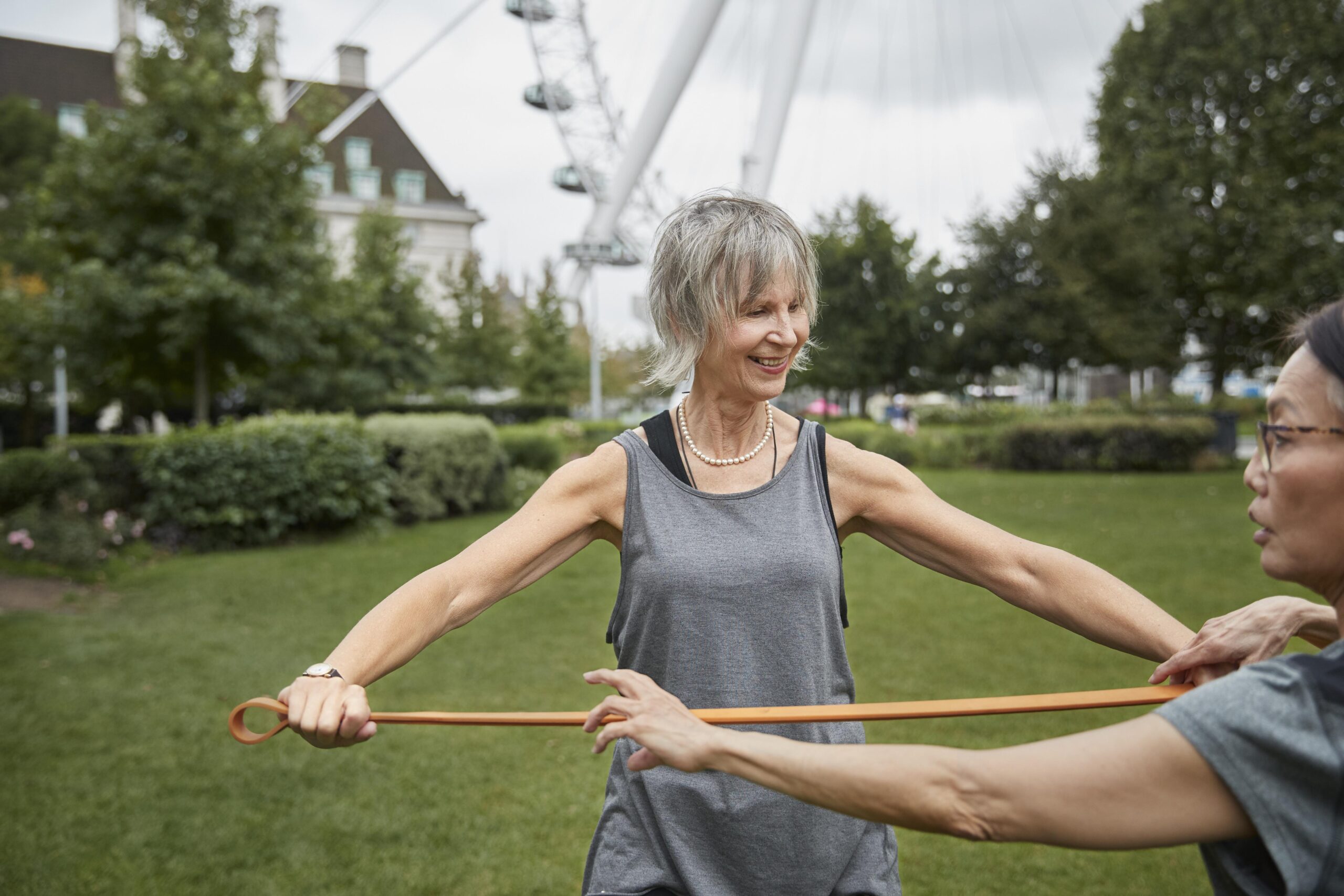Maintaining strength, mobility, and independence is essential for healthy ageing. However, the physical challenges that often accompany ageing—such as joint pain, reduced balance, and limited flexibility—can make this goal difficult to achieve without professional support. This is where Physiotherapy plays a vital role.
Physiotherapists specialise in assessing and treating movement difficulties, helping seniors overcome physical challenges and live life to the fullest. At Bloom Healthcare, our experienced physiotherapists work with older adults to develop personalised strategies that restore mobility, reduce pain, and enhance overall well-being.
The Role of Physiotherapy in Aged Care
Physiotherapy is an invaluable tool for seniors, focusing on restoring and maintaining physical function. It is particularly important in aged care, where the risk of mobility issues, chronic pain, and falls increases with age. Aged care services play a crucial role in providing comprehensive support for seniors, ensuring they receive the necessary assistance to maintain their health and well-being. The Aged Care Act ensures the provision of these services, highlighting the government’s commitment to supporting the elderly.
How Physiotherapists Support Seniors
Physiotherapists help seniors:
- Maintain Independence: Strengthening muscles and improving balance to support daily activities like walking and dressing.
- Manage Pain: Using therapeutic techniques to reduce discomfort and improve quality of life.
- Enhance Confidence: Restoring mobility empowers seniors to stay active and engaged in their communities.
At Bloom Healthcare, we tailor our Physiotherapy programs to address each senior’s unique needs, ensuring practical and meaningful outcomes.
What is Physiotherapy?
Physiotherapy, also known as physical therapy, is a healthcare profession dedicated to diagnosing, treating, and preventing disorders related to the musculoskeletal, cardiovascular, respiratory, and neurological systems. Physiotherapists employ a variety of physical techniques, including exercise, manual therapy, and education, to promote, maintain, and restore physical, psychological, and social well-being. By addressing issues such as pain, mobility, and function, Physiotherapy plays a crucial role in enhancing the quality of life for individuals of all ages, particularly seniors.
How Physiotherapy Supports Fall Prevention
Falls are one of the leading causes of injury among older adults, but many of these incidents are preventable with the right interventions. Physiotherapists play a critical role in reducing fall risks by:
- Identifying and Addressing Risk Factors – Physiotherapists conduct assessments to evaluate balance, gait, and muscle strength, identifying potential fall risks. For example, weak quadriceps or impaired vision can significantly increase the likelihood of falls.
- Balance Training and Strengthening Exercises – Targeted exercises help seniors improve their stability and reaction times. Activities like standing on one leg, heel-to-toe walking, and using resistance bands can strengthen the muscles that support balance.
- Home and Environmental Modifications – Physiotherapists can recommend adjustments to the home environment, such as removing loose rugs, adding grab rails, or improving lighting to reduce hazards.
At Bloom Healthcare, our physiotherapists combine these strategies to create comprehensive fall prevention plans that prioritise safety and confidence. Additionally, the aged care website is a valuable resource for finding more fall prevention strategies and support.
Common Physiotherapy Treatments for Seniors
Physiotherapy offers a wide range of treatments to address the physical challenges seniors face:
Manual Therapy: Hands-on techniques, such as massage and joint mobilisation, are key components of Physiotherapy treatment, relieving pain and improving joint flexibility, making it easier for seniors to move comfortably. This includes the integration of manipulative procedures to the spine and extremity joints, which have evolved significantly since the mid-20th century.
Hydrotherapy: Exercising in warm water provides a low-impact option for improving strength, mobility, and relaxation, particularly for those with arthritis or joint pain.
Exercise Prescription: Customised exercise plans target specific goals, such as enhancing strength, flexibility, or endurance. These plans may include activities like stretching, resistance training, or gentle aerobic exercises.
Assistive Devices and Gait Training: Physiotherapists assess the need for mobility aids, such as walkers or canes, and teach seniors how to use them safely. Gait training further improves walking patterns to reduce discomfort and prevent falls.
Benefits of Physiotherapy for Chronic Conditions
Physiotherapy is especially beneficial for managing chronic health conditions common among seniors:
Arthritis and Joint Pain: Physiotherapy reduces stiffness and pain through joint mobilisation and strengthening exercises, improving function and reducing reliance on pain medications.
Cardiovascular and Pulmonary Health: Seniors with heart or lung conditions can benefit from Physiotherapy programs designed to improve cardiovascular fitness and breathing efficiency.
Neurological Disorders: For conditions like Parkinson’s disease, Physiotherapy helps improve mobility, reduce rigidity, and enhance coordination.
Post-Stroke Recovery: After a stroke, Physiotherapy plays a crucial role in restoring strength, balance, and motor function, helping seniors regain independence.
At Bloom Healthcare, we specialise in addressing these conditions with personalised treatment plans that deliver measurable results. Physiotherapy research has been instrumental in developing these effective treatment plans. Our physical therapists work collaboratively to manage chronic conditions, ensuring patient-focused care and improved treatment outcomes.
Incorporating Exercise Into Daily Routines for Seniors
Consistency is key to maintaining the benefits of Physiotherapy. Seniors are encouraged to incorporate movement into their daily lives through:
- Simple Exercises: Gentle activities like leg lifts, seated marches, or wall push-ups improve strength and circulation.
- Everyday Opportunities: Using household tasks, such as gardening or carrying groceries, as opportunities for functional exercise.
- Routine and Motivation: Establishing regular exercise habits and setting achievable goals fosters long-term engagement.
In addition to Physiotherapy, Occupational Therapy plays a crucial role in helping seniors maintain daily living skills, complementing the physical benefits by focusing on functional independence.
Our Physiotherapists at Bloom Healthcare provide seniors and their families with practical strategies to make exercise an enjoyable part of daily life.
How Physiotherapy Promotes Healthy Ageing
Physiotherapy is a cornerstone of healthy ageing, offering benefits that extend beyond physical health:
- Maintaining Function and Independence: Seniors who stay active and mobile are less likely to require higher levels of care.
- Reducing Hospitalisation Risks: Physiotherapy prevents complications such as falls or inactivity-related health issues.
- Enhancing Emotional Well-Being: Movement stimulates endorphins, improves mood, and combats feelings of isolation.
The Australian Physiotherapy Association provides more information on Physiotherapy’s role in promoting healthy ageing.
Physiotherapy in Residential Aged Care Services
In residential aged care settings, Physiotherapy is integrated into care plans to enhance residents’ quality of life. It is crucial to help residents access aged care services for comprehensive support. Services include:
Group Therapy Programs: Socially engaging activities, such as group exercises or walking clubs, promote fitness while fostering a sense of community.
Individualised Care Plans: Physiotherapists develop personalised treatments for specific health concerns, such as post-surgery recovery or chronic pain management.
Multidisciplinary Collaboration: Physiotherapists work alongside occupational therapists, dietitians, and nurses to deliver comprehensive care. The Canadian Physiotherapy Association provides structured training programs for physiotherapists working in aged care, enhancing their skills and knowledge.
Physiotherapy for Rehabilitation in Seniors
Rehabilitation is a critical focus of Physiotherapy, particularly after illness, surgery, or injury, with rehabilitation centres playing a key role in post-surgery recovery.
Post-Surgery Recovery: After procedures like hip or knee replacements, Physiotherapy helps seniors regain mobility, strength, and confidence. The evolving landscape of Physiotherapy services has seen a shift from hospital-centric care to outpatient settings, rehabilitation centres, and medical centres.
Restoring Function: For seniors recovering from fractures, hospitalisation, or prolonged inactivity, Physiotherapy accelerates recovery and prevents further decline.
Physiotherapy for Cognitive Impairment
Physiotherapy can significantly impact the management of cognitive impairment, especially in older adults. Cognitive impairment can hinder an individual’s ability to perform daily activities, maintain independence, and engage in social interactions. Physiotherapists assist individuals with cognitive impairment by:
- Assessing Physical Abilities and Limitations: Conducting thorough evaluations to understand everyone’s unique challenges.
- Developing Personalised Exercise Programs: Crafting tailored exercise routines to enhance strength, balance, and mobility.
- Providing Education on Fall Prevention and Safety: Teaching strategies to minimise fall risks and ensure a safer living environment.
- Enhancing Cognitive Function Through Physical Activity: Utilising exercises that stimulate both the body and mind to improve cognitive abilities.
- Improving Communication and Social Interaction Skills: Encouraging activities that foster better communication and social engagement.
Physiotherapists collaborate with other healthcare professionals, such as Occupational Therapists and Speech Therapists, to deliver comprehensive care for individuals with cognitive impairment. This multidisciplinary approach ensures that all aspects of a senior’s health are addressed, promoting overall well-being.
Physiotherapy for Palliative Care
Physiotherapy is an essential component of palliative care, focusing on enhancing the quality of life for individuals with life-limiting illnesses. Physiotherapists support individuals with palliative care needs by:
- Managing Pain and Discomfort: Using techniques like manual therapy and gentle exercises to alleviate pain and improve comfort.
- Improving Mobility and Function: Helping individuals maintain or regain mobility to perform daily activities with greater ease.
- Enhancing Respiratory Function: Providing exercises and techniques to improve breathing efficiency and reduce respiratory distress.
- Providing Education on Energy Conservation and Pacing: Teaching strategies to manage energy levels and avoid fatigue.
- Supporting Caregivers and Family Members: Offering guidance and support to those caring for individuals with palliative care needs.
Physiotherapists work closely with other healthcare professionals, including doctors and nurses, to provide holistic care for individuals in palliative care. They also offer support and guidance on advance care planning and end-of-life care, ensuring that patients and their families receive compassionate and comprehensive support during challenging times.
The Role of Technology in Physiotherapy Research for Seniors
Technology is transforming Physiotherapy, making it more accessible and effective:
- Virtual Physiotherapy: Telehealth sessions allow seniors to access expert guidance from the comfort of home.
- Assistive Technology: Wearable devices and apps help seniors track progress and stay motivated during home-based exercises.
- Advancing Manual Therapy Worldwide: Technology plays a crucial role in advancing manual therapy worldwide by enabling innovative treatment techniques and fostering global collaboration.
How to Access Aged Care Services for Seniors
Physiotherapy services can be accessed through:
- Aged Care Packages: Many government-funded packages include Physiotherapy as part of a care plan.
- The NDIS: Eligible participants can receive Physiotherapy under capacity-building supports.
At Bloom Healthcare, we guide families through funding options and connect them with qualified physiotherapists specialising in aged care.
Real-Life Success Stories
The impact of Physiotherapy can be life-changing. One senior regained the ability to walk confidently after a fall, while another recovering from a stroke learned to use adaptive techniques for daily tasks. These stories highlight how Physiotherapy restores both mobility and hope.
Physiotherapy is a powerful tool for enhancing strength, mobility, and independence in aged care. From fall prevention to rehabilitation and chronic condition management, physiotherapists provide seniors with the support they need to age with confidence and dignity.
At Bloom Healthcare, our Physiotherapists are committed to delivering personalised care that meets the unique needs of every senior. If you or a loved one could benefit from Physiotherapy, contact us today to learn how we can help.




